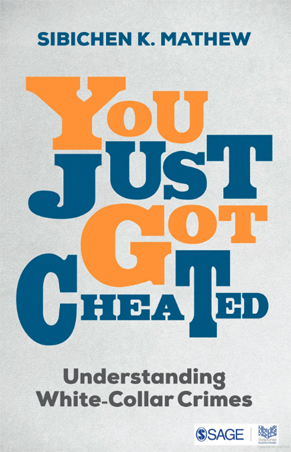Author: Sibichen K Mathew
ISBN No: 9789-3538-84338
Review date: 18/04/2024
No of pages: 400
Publisher: Sage
Publisher URL:
https://uk.sagepub.com/en-gb/eur/you-just-got-cheated/book275386
Year of publication: 30/10/2020
Brief:
While the author of this book is an Indian taxman, who works for the IRS (Indian Revenue Service), he’s also a member of the global association for counter-fraud practitioners ACFE. As an aside, the author praises the ‘vast resources’ provided by the ACFE, and indeed there’s plenty of learning to be had on the ACFE website, including in the wake of Covid-19.
A British reader might find the Indian case studies newest and the Indian perspective of most interest, the author is well read – both in terms of literature more generally and the sources for his subject; such as the audit firm PwC, the anti-corruption pressure group Transparency International, and the investigations consultancy Kroll. He gives plenty of examples from around the world (including a 1720s British example, the South Sea Bubble).
All that also serves to show that no country has a monopoly on WCC (White-Collar Crime). Corporate crime can equally be the 1984 Bhopal disaster; a fire at a chicken factory in North Carolina; or UK workers suffering from asbestos dust. The victims, as the author reminds us, are the forgotten victims in all these stories. WCC can kill; whether a harmful drug from a pharma firm, or adulterated food, the WCC may not be a violent person, but the fall-out is.
The book ranges over cases by industry and sector – healthcare, education and religion (Indian and other nations) – besides law and justice (if that is the right word – the author sees ‘flawed investigation, weak prosecution, clogged courts’), banking and other regulations, politics (the more ‘networked’, that is, well-connected, the criminal is, ‘the easier it is to get away from any investigation or punishment’) and audit and whistle-blowers (who so often turn from heroes into victims themselves).
Morality and economics also come into the book, for as the author points out, the crime is often committed in ‘an environment of trust’. The WCC abuses the trust, whether it’s an elderly person in a care home, or someone investing savings. As Sibichen K Mathew sets out in chapter seven, ‘corporates consider political lobbying and bribing officials as a business necessity, cartelisation as a business strategy, deceptive disclosures as systemic sophistication and tax evasion as tax planning’.
It’s remarkable how seldom the criminal, no matter how brazen, has any sense of guilt; indeed, the WCC may see himself and portray himself as a victim.
In other words, WCC is far more than a scam or Ponzi scheme against investors; the losses felt by the victims are not only financial, but mental and physical. As the title shouts to the reader, this is personal! Whether you are cheated out of your tax returns, or what you pay for medicine, or services.
This most readable and passionate book covers plenty of ground. It may introduce the reader to plenty of things, such as the defining of WCC by the American sociologist Edwin Sutherland. And at £16 it offers excellent value.
Chapter titles:
What Constitutes White-Collar Criminality? Where Is Your Money? The Investment Frauds and the Victims Too Large to Fail; Too Big to Jail? Corporate Frauds and Victims Profits through Peril: Corporate Victimization of the Planet Blood Suckers: Occupational Abuses The Unholy Nexus: The Powerful World of Bribery and Corruption Your Life in Their Hands: Crimes in Health and Pharma Sectors Gullible Victims: Corporate Abuse of Consumers White-Collar Crimes in Education In the Name of God: The Victims of Religious Crimes Cyber Victims Why People Commit White-Collar Crimes and Why Others Fall Victim? Curbing White-Collar Crime and Preventing Victimization Heroes Turn Victims: Whistleblowers of White-Collar Crime










